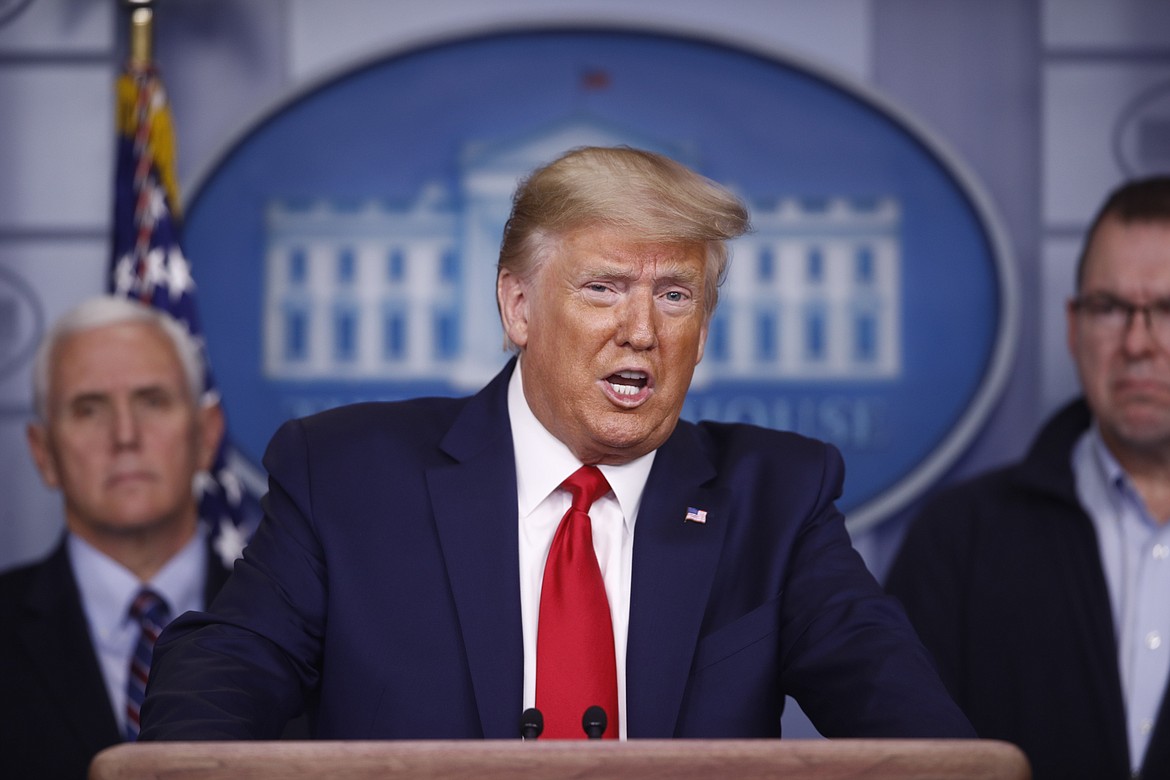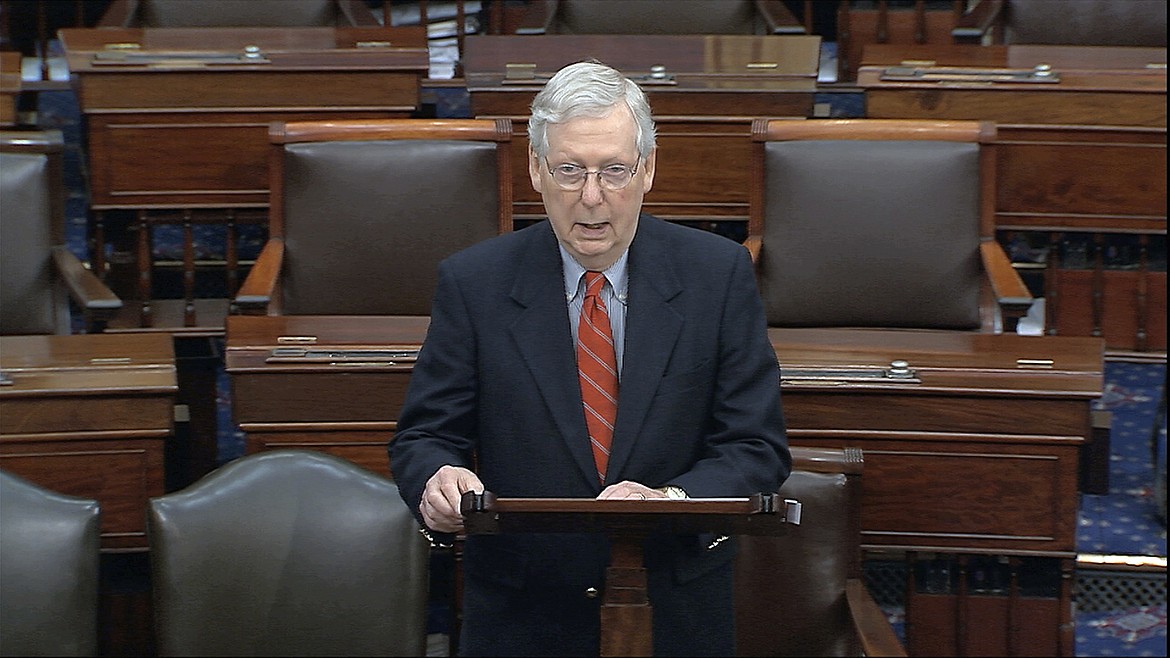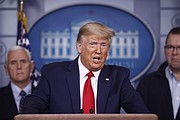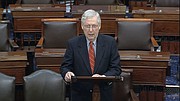As crisis deepens, congressional rescue deal teeters
By ANDREW TAYLOR, JONATHAN LEMIRE and LISA MASCARO
Associated Press
WASHINGTON (AP) — Top-level negotiations between Congress and White House teetered Sunday over a nearly $1.4 trillion economic rescue package, as the coronavirus crisis deepened, the nation shut down and the first U.S. senator tested positive for the disease.
President Donald Trump tweeted “many things to discuss” ahead of an evening press briefing.
At the otherwise emptied out Capitol, the draft aid package was declared insufficient by Democrats, who argued it was tilted toward corporations rather than workers and healthcare providers. The setback sent Republicans back to the negotiating table.
With a population on edge and shell-shocked financial markets poised to reopen Monday, all sides were hoping for an agreement that would provide some relief against the pandemic’s twin health and economic crises, now believed likely to stretch for several months.
“Americans don’t need to see us haggling endlessly,” warned Senate Majority Leader McConnell, his voice rising on the Senate floor. He wants passage of the package by Monday.
But Democrats say the largely GOP-led effort does not go far enough to provide health care and unemployment aid for Americans, and fails to put restraints on a proposed $500 billion “slush fund” for corporations.
Senate Democratic leader Chuck Schumer said the draft package “significantly cut back our hospitals, our cities, our states, our medical workers and so many others needed in this crisis.”
House Speaker Nancy Pelosi invoked Pope Francis in urging colleagues to “take responsibility” as Democrats prepared their own draft.
While the congressional leaders worked to send help, alarms were being sounded from coast to coast about the wave of coronavirus cases about to crash onto the nation’s health system.
New York City Mayor Bill de Blasio had dire, urgent news from the pandemic’s U.S. epicenter: “April and May are going to be a lot worse,” he said on NBC’s “Meet the Press.”
De Blasio all but begged Washington to help procure ventilators and other medical supplies. He accused the president of “not lifting a finger” to help.
“If the president doesn’t act, people will die who could have lived otherwise,” he said.
This as the first senator, Republican Rand Paul of Kentucky, announced he tested positive for COVID-19, the disease caused by the virus. Paul, who is a doctor and close ally of the president, said in a tweet he was not showing symptoms and was in quarantine.
Paul was seen at a GOP senators’ lunch on Friday and swimming in the Senate gym pool on Sunday morning. His office said he left the Senate immediately after learning his diagnosis.
A growing list of lawmakers have cycled in and out of isolation after exposure, and two members of the House have said they tested positive.
Trump has defiantly pushed back against criticism he was slow to respond to the crisis, though he continues to send mixed messages as to what, exactly, the federal government is doing.
In recent days, he invoked the Defense Protection Act, a rarely used, decades-old authority that can be used to compel the private sector to manufacture needed medical supplies like masks and ventilators, but said he had yet to use it.
The president tweeted Sunday that automakers General Motors and Tesla were given “the go ahead” to make ventilators and other products. But no automaker is anywhere close to making medical gear such as ventilators and remain months away, if not longer. Nor do the car companies need the president’s permission to move forward.
At the same time, Trump lashed out at the Illinois governor and others for being critical of the response. He tweeted that they should not be “blaming the federal government for their own shortcomings.”
The urgency to act is mounting, as jobless claims skyrocket, businesses shutter and the financial markets are set to re-open Monday eager for signs that Washington can soften the blow of the healthcare crisis and what experts say is a looming recession.
At issue is how best to keep paychecks flowing for millions of workers abruptly sidelined by the crisis, shore up business and create a so-called Marshall Plan for U.S. hospitals — evoking the postwar effort to rebuild Western Europe.
Officials put the price tag of the rescue package at nearly $1.4 trillion and said that with other measures from the Federal Reserve it could pump $2 trillion into the U.S. economy.
“It will get done,” said Treasury Secretary Steven Mnuchin on “Fox News Sunday.
Mnuchin, who was leading a third day of nonstop talks on Capitol Hill, said the plan was meant to prop up the nation’s weakened economy for the next 10 to 12 weeks.
Mnuchin said workers and businesses will get assistance to help cover payrolls for the next 10 weeks; unemployment insurance; and a one-time “bridge payment” of about $3,000 for a family of four.
Hospitals, he said, will get approximately $110 billion for the expected influx of sick patients.
The treasury secretary said a significant part of the package will involve working with the Federal Reserve for up to $4 trillion of liquidity to support the economy with “broad-based lending programs.”
But Democrats have pushed for add-ons, including food security aid, small business loans and other measures for workers — saying the three months of unemployment insurance offered under the draft plan was not enough.
They warned the draft plan’s $500 billion “corporate slush fund” does not put enough restraints on business, saying the ban on corporate stock buy-backs are weak and the limits on executive pay are only for two years.
“We’re not here to create a slush fund for Donald Trump and his family, or a slush fund for the Treasury Department to be able to hand out to their friends,” said Massachusetts Sen. Elizabeth Warren. “We’re here to help workers, we’re here to help hospitals.”
There is also a $242 billion proposal for emergency supplemental food, hospital and public health needs, including for the Centers for Disease Control.
The details are coming from drafts of both bills circulating among lobbyists but not yet released to the public. They were obtained by The Associated Press.
For most people, the new coronavirus causes only mild or moderate symptoms, such as fever and cough. For some, especially older adults and people with existing health problems, it can cause more severe illness, including pneumonia.
The vast majority of people recover from the new virus. According to the World Health Organization, people with mild illness recover in about two weeks, while those with more severe illness may take three to six weeks to recover.
–––
Bev Banks contributed. Associated Press writers Colleen Long, Hope Yen, Mary Clare Jalonick, Ricardo Alonso-Zaldivar, Alan Fram and Padmananda Rama contributed to this report.
–––
The Associated Press receives support for health and science coverage from the Howard Hughes Medical Institute’s Department of Science Education. The AP is solely responsible for all content.





